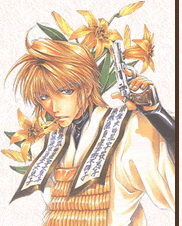






Genjo SanzoGenjo Sanzo is a rough character who carries a gun, smokes excessively, and drinks often. He verbally and physically abuses his traveling partners with a paper fan and is defiantly not a pious individual. He refuses to preach Buddhism, and claims not to even believe in any teachings other than those of his late master. He is also not afraid to kill and has a dark, cynical sense of humor. Genjo Sanzo was found as a baby floating in a river. The monks who found him named him Kouryuu, or “river rat”. The former Sanzo, Koumyou Sanzo, took in the young Kouryuu and allowed him to become his disciple. On the night of Koryuu’s succession to the rank of Sanzo, demons broken into the temple, killed Koumyou and stole one of the founding scriptures of heaven and earth that the Sanzos are charged with guarding. Kouryuu, newly christened Genjo Sanzo, the thirty-second of China, sets out to recover his master’s lost sutra. |
XuanzangUnlike his manga counterpart, Xuanzang is a very pious monk devoted to his order and he never fights. He is coolheaded, compassionate, and extremely spiritual. Xuanzang’s past is somewhat similar to Sanzo’s, however Xi Yoú Ji gave many more details about his parents and their struggles before Xuanzang was born. His father was murdered by a wealthy official who took Xuanzang’s mother as his bride. The official was away on business when Xuanzang’s mother gave birth, and fearing for the life of her child, Xuanzang’s mother bit off the little toe of his right foot (so she could someday find him) and cast him afloat in a nearby river. Some monks rescued him and allowed him to join their order. He became a very high ranking monk because of his devotion to the lord Buddha. |
ComparisonApart from their obvious differences in character, their pasts are moderately similar. In Gensomaden Saiyuki nothing is know about how Sanzo was found a drift in the river. In Xi Yoú Ji, nothing much is said about Xuanzang’s life in the temple before he became a high ranking monk, and therefore, it can be assumed that there are at least a few similarities in their pasts. |
